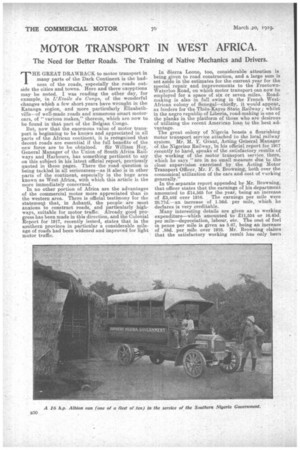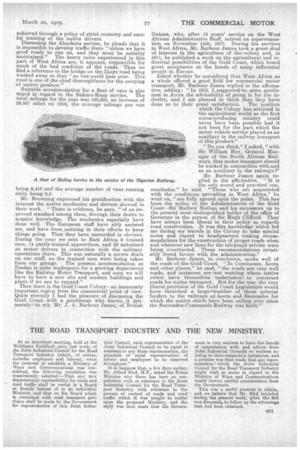MOTOR TRANSPORT IN WEST AFRICA.
Page 10

Page 11

If you've noticed an error in this article please click here to report it so we can fix it.
The Need for Better Roads. The Training of Native Mechanics and Drivers.
T• HE GREAT DRAWBACK to motor transport in many parts of the Dark Continent is the badness of the roads, especially the roads outside the cities and towns. Here and there exceptions may be noted. I was reading the other day, for example, in L'Etoile du Congo, of the wonderful changes which a few short years have wrought in the Katanga region and more particularly Elizabethville—of well-made roads and numerous smart motorcars, of "various makes," thereon, which are now to be found in that part of the Belgian Congo.
But, now that the enormous value of motor transport is beginning to be known and appreciated in all parts of the African continent, it is recognized that decent roads are essential if the full benefits of the new force are to be obtained. Sir William Hoy, General Manager of the Union of South Africa Railways and Harbours, has something pertinent to say on this subject in his latest official report, previously quoted in these pages. There the road question is being tackled in all seriousness—as it also is in other parts of the continent, especially in the huge area known as West Africa, with which this article is the more immediately concerned. In no other portion of Africa are the advantages of the commercial motor more appreciated than in the western area. There is official testimony for the statemertt that, in Ashanti, the people are most anxious to construct roads, and particularly highways, suitable for motor traffic. Already goad progress has been made in this direction and the Colonial Report for 1917, recently issued, states that in the southern province in particular a considerable mileage of roads had been widened and improved for light motor traffic. In Sierra Leone, too considerable attention is being given to road construction, and a large sum is set aside in the estimates for the current year for the special repair and improvements to the FreetownWaterloo Road, on -which motor transport can now be employed •for a space of six or seven miles. Roadmaking is also in full swingin the French WestAfrican colony of Senegal—chiefly, it would appear, as feeders for the Thies-Kayes State Railway ; whilst in the negro republic of Liberia, road-making is one of the planks in the platform of those who are desirous of utilizing the recent American loan to the best advantage.
The great colony of Nigeria boasts a flourishing motor transport service attached to the local railway system. Mr. M. Y. Grant, Acting General Manager of the Nigerian Railway, in his official rePort for 1917 recently to hand, speaks of the satisfactory results of the working of the motor transport service there, which he says "are in no small measure due to the close supervision exercised by the. Acting -Motor Transport Officer, Mr. F. S. Browning, both over the economical utilization of the cars and cost of v-orking generally." In the separate report appended by Mr. Browning, that officer states that the earnings of his department amounted to £14,565 for the year, being an increase of £3,482 over 1916. The earnings per mile were 20.77d.—an increase of 1.56d. per mile, which he declares is very creditable. Many interesting details are given as to working expenditure—which amounted to £11,534 or 16.45d. per mile—depreciation, labour, etc. The cost of fuel in pence per mile is given as 5.67 being an increase of .88d. per mile over 1916. Mr'. Browning claims that the satisfactory working result has only been achieved through a policy of strict economy and careful training of the native drivers.
Discussing the Abeokuta service, he pleads that it is impossible to develop traffic there "unless we have good roads to run on, and they must be suitably maintained." The heavy rains experienced in this part of West Africa, are, it appears, responsible for much of the bad condition of the roads. Thus we find a reference to the bridge on the Ijaiye road being washed away so that no van could pass over. This road is one of the chief thoroughfares for the carrying of native produce." Suitable accommodation for a fleet of vans is also • urged in regard to the Bukuru-Ropp service. The total mileage for the year was 168,285, an increase of 29,867 miles on 1916, the average mileage per van being 9,418 and the average number of vans running daily being 9.3.
Mr. Browning expressed his gratification with the interest the native mechanics and drivers showed in their work. "There is evidence, he says, "of an improved standard among them, through their desire to acquire knowledge. The mechanics especially have done well. The European staff have ably assisted me, and have been untiring in their efforts to keep things going. That they have succeeded is obvious. During the year we sent to East Africa 9 trained men, 14 partly-trained apprentices, and 32 untrained as motor drivers in connection with the military operations there. This was naturally a severe drain on our staff, as the trained men were being taken from our garage. The present accommodation at Ibadan is quite inadequate for a growing department like the Railway Motor Transport, and soon we will have to have a new site and modern buildings and plant if we are to expand."
Then there is the Gold Coast Colony--an immensely important region from the commercial point of view. Quite recently I had the pleasure of discussing the Gold Coast with a gentleman who knows ,it intiinately—to wit, Mr. J. A. Barbour James, of British
Guiana, who? after 15 years' service on the West African Administrative Staff, retired On superannuation on November 14th, 1917. During his services in West Africa, Mr. Barbour James took a great deal of interest in the agriculture of the colony and in 1911, he published a work on. the agricultural 'and industrial possibilities of the Gold Coast, which found great acceptance at the hands of many influential people in Europe. Asked whether he considered that West Africa as a whole offered a good field for commercial motor transport, Mr. Barbour James replied in the affirmative, adding : "In 1912, I suggested,to some, gentlemen in Accra the advisability of going in for the industry, and I am pleased to think that they have
done so to their great satisfaction. The position which the Colony has attained in the agricultural world as the first cocoa-producing country could never have been possible had it not been for the part which the motor vehicle service played as an auxiliary to the railway transport of this product."
"Do you think," I asked, "with Sir William Hoy, General Manager of the South African Railways, that motor transport should be worked in conjunction with and as an auxiliary to the railways?"
Mr. Barbour James again re an Railway, plied in the affirmative. "It is the only sound and practical conconclusion." he said. "Those who are acquainted with the conditions prevailing in West Africa," he went on, "are fully agreed upon the point. This has been the policy of the Administrators of the Gold Coast--Sir Mathew Nathan and his successors up to the present most distinguished holder of the office of Governor in the person of Sir Hugh Clifford. They have always been liberal in their policy as regards road construction. It was this knowledgewhich led me during my travels in the Colony to take special notes and report to headquarters making recommendations for the construction of proper roads when and wherever new lines for the telegraph service were being constructed. These recommendations invariably found favour with the administration." Mr. Barbour James, in conclusion, spoke well of the roads of the Gold Coast. "In Commassie, Accra. and other places," he said, "the roads' are very well made, and instances are not wanting where native rulers have themselves undertaken to construct roads for motor transport. But for the war, the very liberal provision of the Gold Coast Legislature would have furnished a largezl)number of these arterial feeders to the railways at Accra and Seccoadee for which the native chiefs have been calling ever since the Seccondee-Commassie Railway was built."






















